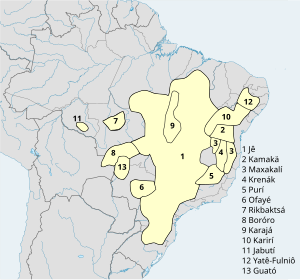The Trans–São Francisco languages[1] (Portuguese: Transanfranciscano) are a proposed grouping of languages within Macro-Jê. They consist of the Krenák, Maxakalían, and possibly also the Kamakã families. The Trans–São Francisco group was originally proposed and demonstrated by Nikulin and Silva (2020) under the name of Maxakalí-Krenák.[2]
| Trans–São Francisco | |
|---|---|
| Transanfranciscano | |
| Geographic distribution | São Francisco River basin of Northeast Brazil |
| Linguistic classification | Macro-Jê
|
| Subdivisions | |
| Language codes | |
| Glottolog | None |
 The Macro-Jê families according to Kaufman | |
They are named after the São Francisco River of Northeast Brazil.[1]
Classification
editInternal classification of Trans–São Francisco by Nikulin (2020):[1]
- Trans–São Francisco
- Krenák (Borum)
- Maxakalían
- Malalí
- Nuclear Maxakalían
- ? Kamakã (possibly part of Trans–São Francisco)
Proto-language
edit| Proto-Trans–São Francisco | |
|---|---|
| Reconstruction of | Trans–São Francisco languages |
Reconstructed ancestor | |
| Lower-order reconstructions | |
Proto-Trans–São Francisco has been reconstructed by Nikulin (2020),[1] while there is also a Proto-Kamakã reconstruction by Martins (2007).[3]
See also
editFurther reading
edit- Nikulin, Andrey and Mário André Coelho da Silva. As línguas Maxakalí e Krenák dentro do tronco Macro-Jê. Cadernos de Etnolingüística (ISSN 1946-7095), (8)1:1-64.
References
edit- ^ a b c d Nikulin, Andrey. 2020. Proto-Macro-Jê: um estudo reconstrutivo. Doctoral dissertation, University of Brasília.
- ^ Nikulin, Andrey; Silva, Mário André Coelho da (2020). "As línguas Maxakalí e Krenák dentro do tronco Macro-Jê". Cadernos de Etnolingüística. 8 (1): 1–64.
- ^ Martins, Andérbio Márcio Silva. 2007. Revisão da Família Lingüística Kamakã Proposta por Chestmir Loukotka. MA thesis, University of Brasília.